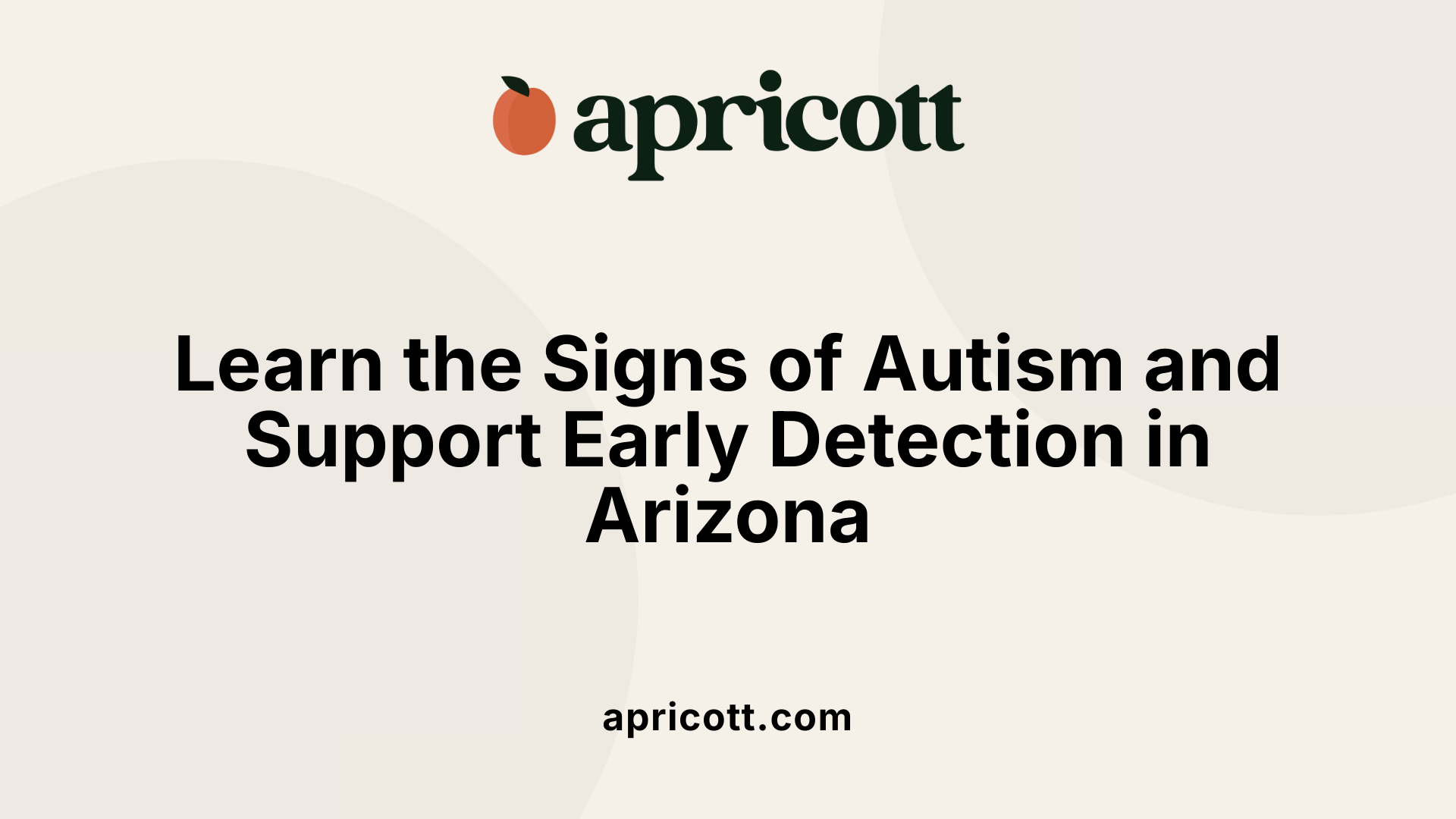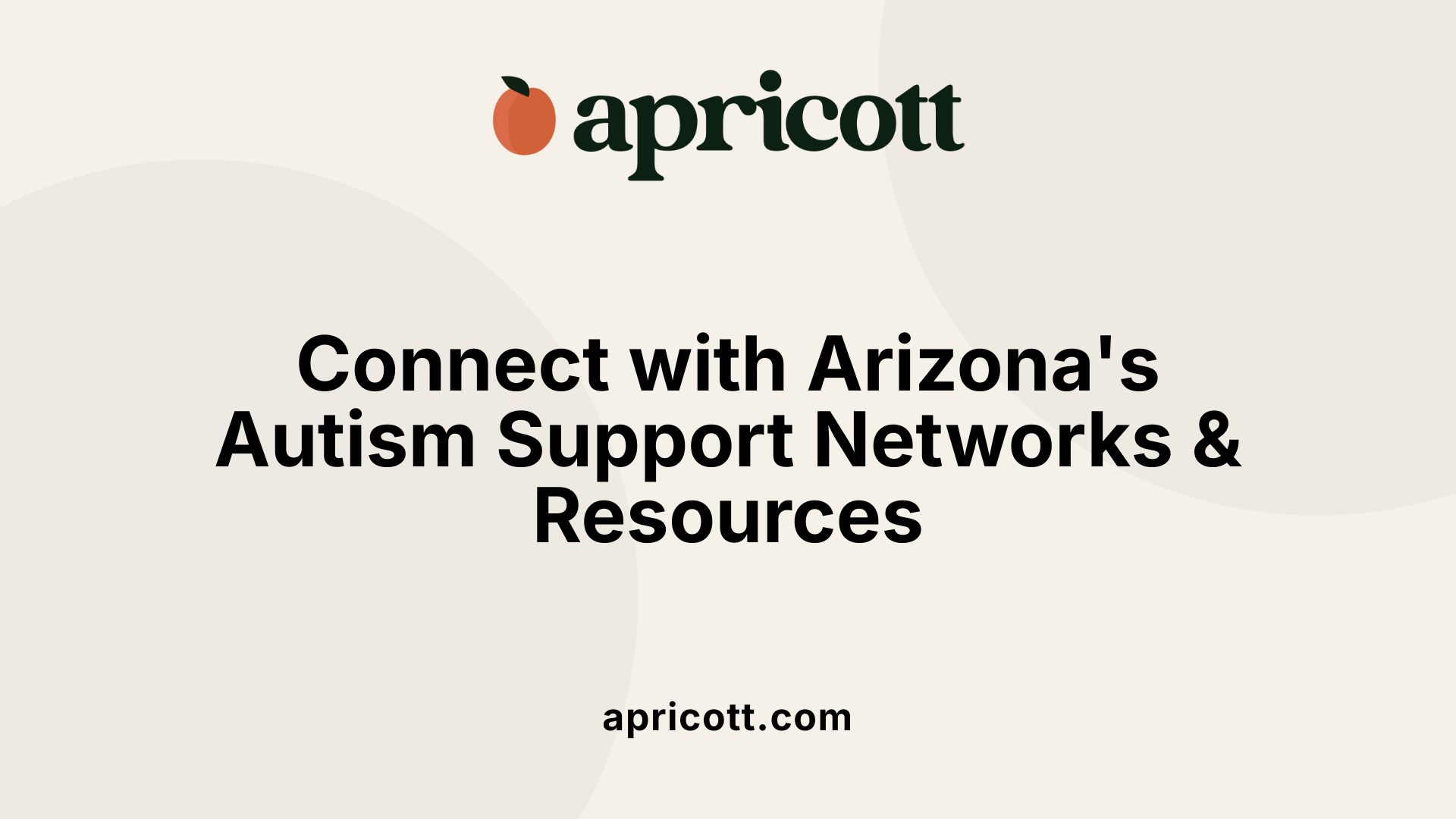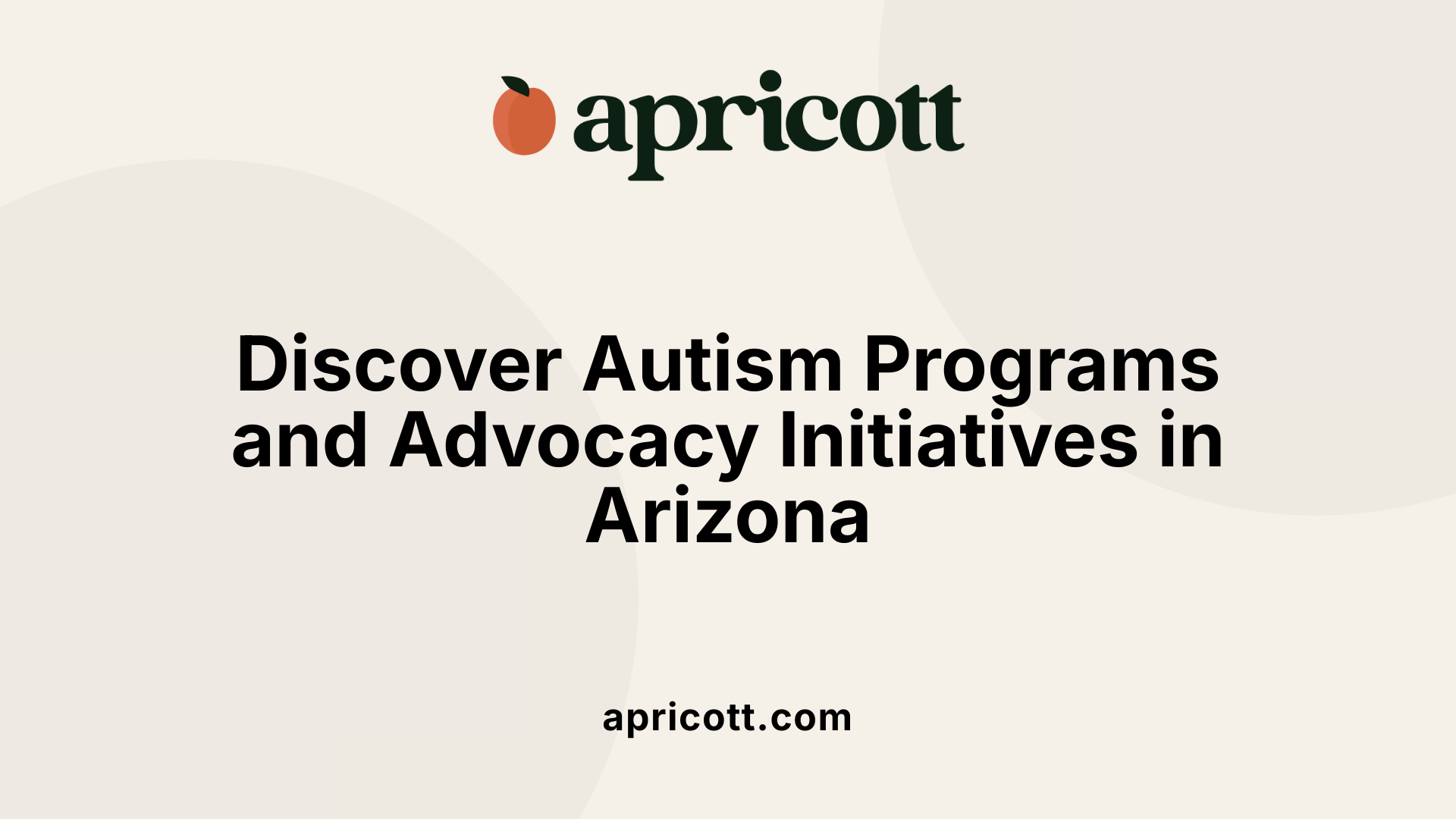December 2, 2025
Comprehensive Guide to Autism Support and Resources in Arizona
Arizona offers a diverse and robust network of resources, programs, and advocacy efforts aimed at supporting individuals with Autism Spectrum Disorder (ASD) and their families. From early diagnosis to adult services, community events, and statewide initiatives, this guide provides an in-depth look at the available support systems, educational tools, and community involvement opportunities within Arizona. Whether you are seeking information on evidence-based treatments, local support groups, or legal advocacy, understanding the breadth of services in Arizona can empower families and caregivers to access the help they need.

Autism Spectrum Disorder (ASD) affects communication, social interaction, and behavior, and manifests in various ways. Common signs include difficulty maintaining eye contact, delayed speech or language development, and repetitive behaviors like hand-flapping or rocking. Children may also show a narrow range of interests or intense focus on specific topics.
In Arizona, early detection is crucial. Families and caregivers might notice these signs during routine interactions or early childhood visits. Recognizing the signs early can lead to timely evaluations and interventions, which are essential for supporting development.
Early diagnosis of ASD in Arizona involves a team of professionals, including pediatricians, psychologists, and speech therapists, who perform developmental screenings and behavioral assessments. Tools such as the Autism Diagnostic Observation Schedule (ADOS) are commonly used, often starting at 18-24 months.
The state emphasizes early screening through programs like 'Learn the Signs. Act Early,' which promotes awareness and prompts parents to seek evaluations if they notice developmental delays.
For children under age three who are at risk but not yet diagnosed, services under the Individuals with Disabilities Education Act (IDEA) can provide early intervention. Over age three, parents are encouraged to contact local school districts for evaluation to determine eligibility for special education services.
Arizona offers a range of resources and programs tailored to help children and adults with ASD. Evidence-based therapies such as Applied Behavior Analysis (ABA), speech therapy, and occupational therapy are widely available in the state.
Educational interventions are supported through initiatives like the Arizona Statewide Autism Project (AzSAP), which collaborates with school districts to improve instruction and support.
Community organizations like the Southwest Autism Research & Resource Center (SARRC) offer treatment programs, training, and support for families and professionals. Additionally, statewide coalitions and advocacy groups work to promote awareness, research, and policy reforms to enhance services.
By connecting with local resources, families in Arizona can navigate their options for diagnosis, intervention, and ongoing support, improving quality of life for individuals with ASD.

Arizona offers a variety of resources to assist families, adults, and educators in accessing autism-related services. For medical and healthcare guidance, the Arizona Health Care Cost Containment System (AHCCCS) provides comprehensive information on autism spectrum disorder evaluations, treatment providers, and policy updates. Families can email them directly at ASD@azahcccs.gov for specific support.
State agencies also play a vital role. The Arizona Department of Economic Security (DES) maintains a Community Resources webpage that lists contacts for developmental and behavioral health services across the state. Meanwhile, the Arizona Department of Education provides critical guidance on special education services, including eligibility criteria for autism and early detection programs such as AZ Find.
Local organizations are equally important. The Autism Society of Greater Phoenix, established in 1973, serves communities throughout Arizona, offering support groups, community training, and advocacy tailored to local needs. Other organizations like NAZCARE and the Family Involvement Center help connect families with support networks and resources.
Advocacy efforts are further coordinated through the statewide Autism Advisory Committee, established by the Governor’s Office. This body works to improve services and policies for individuals with ASD.
To stay current, families can also participate in public feedback channels offered by these agencies and organizations. These platforms enable families to share their experiences, suggest improvements, and stay informed about new programs or changes in autism services within Arizona.
In summary, Arizona provides accessible contact points and resources through state agencies, nonprofit organizations, and advocacy groups. Utilizing these connections ensures families and individuals can find the guidance needed to navigate autism services effectively.
| Organization / Agency | Focus Area | Contact / Link | Additional Notes |
|---|---|---|---|
| AHCCCS | Healthcare Policy & Evaluation | ASD@azahcccs.gov | Offers evaluations, treatment info |
| Arizona Dept. of Education | Education & Early Detection | azed.gov | Provides special ed info, AZ Find |
| Arizona Dept. of Economic Security | Community Resources | des.az.gov | Developmental support services |
| Autism Society of Greater Phoenix | Community Support & Advocacy | azautismsociety.org | Local events, social groups |
| Statewide Autism Advisory Committee | Policy & System Improvement | azautism.gov | State-level autism guidance |
This comprehensive network ensures families have multiple avenues for support, guidance, and advocacy within Arizona’s autism community.
 Arizona provides a variety of programs, community services, and advocacy organizations aimed at supporting individuals with autism and their families. These resources cover educational, medical, legal, and social aspects of autism support.
Arizona provides a variety of programs, community services, and advocacy organizations aimed at supporting individuals with autism and their families. These resources cover educational, medical, legal, and social aspects of autism support.
One prominent organization is the Autism Society of Greater Phoenix (ASGP), founded in 1973, making it the oldest autism organization in Arizona. ASGP offers community training, social events, and support groups throughout the state. It also provides bilingual resources, particularly in Spanish, to serve Arizona's diverse population.
Supporting families and individuals impacted by autism are groups like Raising Special Kids and Parent Support Arizona. Raising Special Kids offers free support and resources, helping families navigate educational rights, therapy options, and community services. Parent Support Arizona advocates for educational and civil rights, ensuring the needs of autistic individuals are met within the public system.
Statewide initiatives include the Arizona Autism Coalition and the ASD Advisory Committee, established by the governor's office to enhance policies and improve service delivery. These organizations promote awareness, resource sharing, and advocacy efforts to reform autism support systems.
Community outreach extends to early diagnosis and intervention programs. Arizona utilizes 'Learn the Signs. Act Early' resources and promotes early detection via well-child checkups. School districts play a role in evaluating developmental delays for children over age three, helping secure special education services under IDEA.
Healthcare support is also accessible through resources like AHCCCS, Arizona’s Medicaid program, which offers health coverage for individuals with autism. The Arizona Division of Developmental Disabilities and programs like the Arizona Long Term Care System (ALTCS) provide ongoing support and residential care for eligible individuals.
In summary, Arizona's network of programs and organizations ensures a comprehensive approach to autism support—ranging from early diagnosis and education to community engagement and advocacy—making vital resources available to residents across the state.
| Program/Organization | Focus Areas | Additional Details |
|---|---|---|
| Autism Society of Greater Phoenix | Community support, advocacy | Established 1973, bilingual resources, national recognition |
| Raising Special Kids | Family support, education | Free resources, guidance on educational rights |
| Arizona Autism Coalition | Advocacy, resource sharing | Promotes autism system reform, hosts annual events |
| ASD Advisory Committee | Policy and service improvement | Supported by the governor’s office |
| AHCCCS | Healthcare coverage | Supports members with autism, comprehensive health services |
| Arizona Division of Developmental Disabilities | Support services | Supports eligible individuals, promotes independence |
Arizona’s broad spectrum of resources demonstrates its commitment to supporting individuals with autism at all stages of life, emphasizing community involvement, early intervention, and systemic advocacy.
 Arizona actively hosts a range of autism-related events, campaigns, and educational programs throughout the year. These initiatives aim to promote awareness, acceptance, and provide valuable resources for individuals with autism and their families.
Arizona actively hosts a range of autism-related events, campaigns, and educational programs throughout the year. These initiatives aim to promote awareness, acceptance, and provide valuable resources for individuals with autism and their families.
In the Greater Phoenix area and Tucson, families can participate in sensory-friendly activities like the Trunk or Treat events, scheduled for October 18 in Surprise and October 25 in Tempe. These events are designed to be enjoyable and accommodating for children with sensory sensitivities. Additionally, the Fall on the Spectrum Family Autism Festival takes place in Phoenix on October 19, offering a fun day packed with activities and community support.
The Arizona Autism Coalition, a prominent organization in the state, organizes annual initiatives such as the "Day of Learning" series and the Autism Expo Resource Fair during spring. These events serve as hubs for sharing latest research, resources, and connecting families with service providers.
In Tucson, the Autism Society of Southern Arizona leads the "All in for Autism" campaign each April. This month-long effort emphasizes acceptance and awareness through various outreach activities, including the debut of a supportive video collage that highlights personal stories and community strength.
Community engagement doesn’t stop there. Events like Pizza with Police in Chandler foster positive interactions between law enforcement and individuals with autism, enhancing community inclusion. Outreach programs across the state are also dedicated to increasing understanding and providing support for autistic individuals and their loved ones.
These ongoing efforts reflect Arizona’s commitment to creating an inclusive environment through diverse events and educational campaigns that inform and empower the community.
Arizona emphasizes early detection of autism through various screening programs and developmental assessments. The state encourages parents to use resources like 'Learn the Signs. Act Early,' which promotes awareness and early recognition of developmental delays. In addition, the '1-Year Well-Baby Check-Up' approach is promoted as an effective method for early detection. Pediatricians and healthcare providers play a crucial role in screening infants and toddlers, facilitating early identification.
For children from birth to age two, Arizona provides the Arizona Early Intervention Program (AzEIP). This statewide service offers support for infants and toddlers showing developmental delays or at risk of autism. Families can access evaluations, therapies, and support services even without a formal diagnosis, ensuring early intervention that can make a significant difference.
Eligibility for special education services in Arizona involves a comprehensive evaluation conducted by a team of qualified professionals, which includes medical and educational assessments. This process considers how autism impacts a child's participation in educational activities.
Children suspected of having autism are evaluated based on documentation like developmental milestones and medical diagnosis, if available. If the evaluation shows that the child's challenges significantly affect their learning or social participation, they become eligible for services under the Individuals with Disabilities Education Act (IDEA).
Once eligible, children receive a Free Appropriate Public Education (FAPE) through Individualized Education Programs (IEPs). These plans tailor educational and therapeutic services to meet each child's unique needs. Local school districts, along with support programs like the Arizona Statewide Autism Project, help ensure that children access evidence-based practices and necessary therapies.
Arizona's efforts are supported by systems like Child FIND, which locates and evaluates children with disabilities from birth through age 21. The state's Autism Spectrum Disorder Advisory Committee and organizations such as SARRC and the Arizona Autism Coalition advocate for improved services, provide training, and foster collaboration among families, professionals, and educators. Family resources, support groups, and professional development are integral parts of the state's approach to early identification and educational support for children with autism.
In Arizona, a variety of evidence-based practices are available to support individuals with autism across the spectrum. These include behavioral therapies, such as Applied Behavior Analysis (ABA), which is widely recognized for its effectiveness in improving communication, social skills, and reducing problematic behaviors. Speech and language therapy are also common interventions, helping children and adults develop essential communication skills tailored to their needs.
Medical interventions may include medications to manage related symptoms or co-occurring conditions, prescribed by healthcare providers experienced in autism care. These treatments are personalized based on comprehensive assessments.
For diagnosis, licensed professionals like Psychologists, Psychiatrists, Developmental Pediatricians, or Certified Pediatricians conduct thorough evaluations using standardized tools. In Arizona, diagnostic services are offered by facilities such as Arizona Autism United, Mayo Clinic, and Arizona Neuropsychology Centers.
Early screening plays a crucial role in timely identification. The Think Autism screening application developed by the Southwest Autism Research & Resource Center (SARRC) is a popular resource that helps parents recognize potential signs and seek professional assessments.
Children under age three at risk of developmental delays can be evaluated through programs funded under the Individuals with Disabilities Education Act (IDEA). For children older than three, local school districts conduct evaluations to determine eligibility for special education services.
Arizona provides a comprehensive network of services through the Arizona Autism Advisory Committee and statewide programs like the Arizona Statewide Autism Project (AzSAP). These initiatives promote family-centered, multidisciplinary approaches that combine behavioral therapies, family training, medication management, and educational support.
Access to these services is facilitated through Medicaid under the AHCCCS program, ensuring many families can receive evaluations and treatments. In addition, services are tailored to meet the needs of diverse populations, including resources in Spanish.
To guide ongoing care, families and professionals have access to web-based training modules such as AFIRM and support from organizations like the Southwest Autism Research & Resource Center and the Autism Society of Greater Phoenix.
| Diagnostic Tools | Therapy Options | Support Services | Additional Resources |
|---|---|---|---|
| Standardized assessments (e.g., ADOS, ADI-R) | ABA therapy | Family training programs | Think Autism screening app |
| Neuropsychological testing | Speech and language therapy | School-based support | Arizona Autism Coalition |
| Developmental evaluations | Occupational therapy | Support groups and social events | AZ Autism Resource Guide |
| Medical evaluations by licensed providers | Medications (as needed) | Legal and advocacy resources | Early detection initiatives |
Arizona continues to expand its autism services, ensuring that diagnosis, intervention, and ongoing support are accessible, evidence-based, and tailored to individuals’ unique needs.
Arizona’s comprehensive autism resources, community programs, and advocacy efforts create a supportive environment for individuals with ASD and their families. With an array of early detection services, educational supports, community activities, and statewide initiatives, Arizona is dedicated to improving quality of life and fostering inclusion for all its residents. Staying informed and connected with local organizations like the Autism Society of Greater Phoenix and the Autism Coalition can help families navigate the available services and advocate for their loved ones effectively. Through ongoing community engagement and continuous improvements in policy and programs, Arizona is committed to advancing autism support for generations to come.